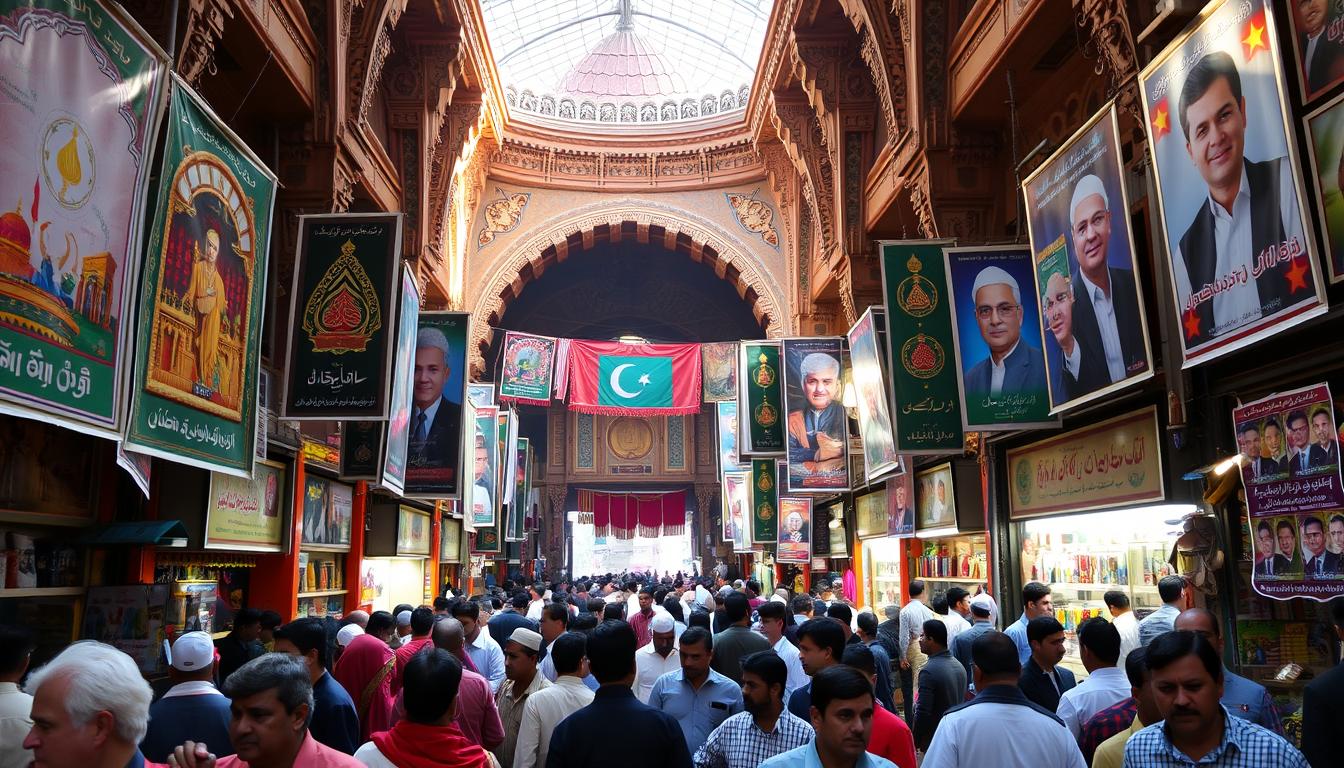In Pakistan, politics and religion are deeply connected. This connection shapes the country’s social and governance systems. Faith is a key part of Pakistan’s identity, influencing its politics and beliefs.
This article will look at how politics and religion interact. We’ll see how they impact policies, freedoms, and social norms in Pakistan today.
Key Takeaways
- The role of religion in Pakistan’s governance and policymaking is deeply entrenched, shaping the country’s political landscape.
- Navigating the intersection of faith and secular interests presents ongoing challenges for the government and citizens.
- Balancing constitutional guarantees of religious freedom with the realities of religious influence in the public sphere is an ongoing struggle.
- The dynamics of power and faith have evolved over time, reflecting Pakistan’s complex social and historical dynamics.
- Interfaith dialogue and pluralism are crucial in fostering greater understanding and tolerance in this diverse nation.
Religious Beliefs and Political Ideologies
In Pakistan, religious beliefs and political ideologies mix in a complex way. Faith shapes the political scene, as people and parties base their actions on their beliefs.
Exploring the Influence of Faith on Governance
The faith of leaders in Pakistan greatly affects how the country is run. Politicians and officials see their religious values as key to their decisions. This blend of faith and politics can lead to lively debates.
The Role of Moral Values in Policymaking
Moral values, based on faith and culture, are also key in Pakistan’s policy-making. Leaders use their moral beliefs to guide their views on many issues. This mix of morality and politics shapes the country’s policies.
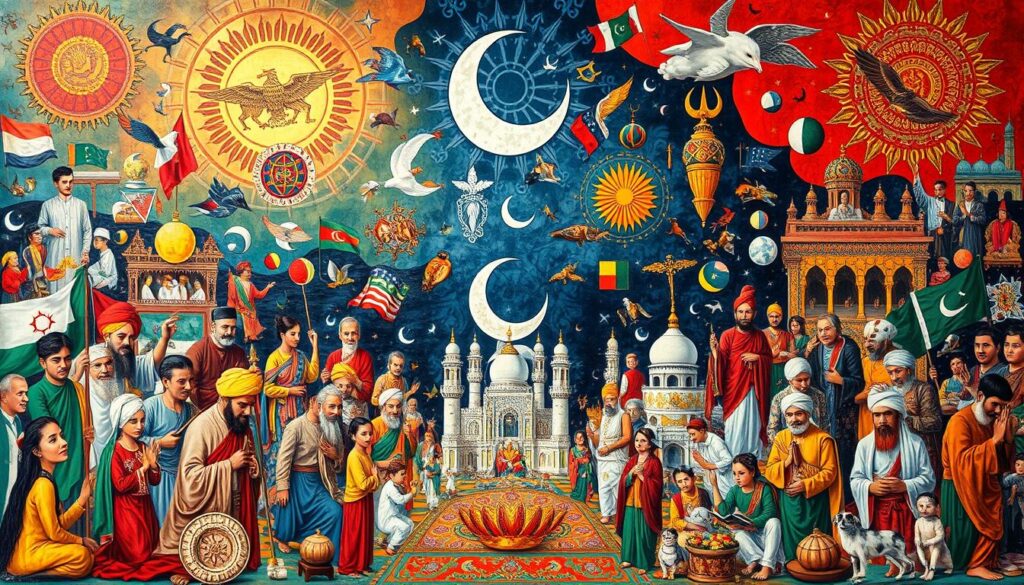
“The separation of religion and politics is a false dichotomy in Pakistan, as the two realms are deeply intertwined in the national consciousness.”
The link between faith, politics, and governance in Pakistan is a topic of much discussion. Grasping this complex relationship is vital for understanding the country’s politics. It helps ensure that all citizens’ interests are considered.
Government Policies and Freedom of Religion
In Pakistan, the government’s policies greatly affect religious freedom. The country’s constitution says everyone has the right to their religion. But, this freedom comes with some limits. It’s important to understand how these policies and guarantees work together.
Examining Constitutional Guarantees and Limitations
The Pakistani constitution says people can freely practice their religion. But, it also lets the government put limits to keep order and morality. This balance leads to many discussions about how far religious freedom should go.
- The constitution bans discrimination based on religion, giving everyone equal rights.
- The government can control religious groups and activities to stop extremism or keep peace.
- Some religious acts might be limited if they could harm public safety or national security.
This shows the government’s tough job in balancing individual freedoms with the nation’s needs. They must be careful and understand the law well.
“The government’s policies must strike a careful balance between safeguarding religious freedom and ensuring the overall well-being of society.”
As the government makes new policies, talking openly with different religious groups is key. This can build trust and help create a more united society.
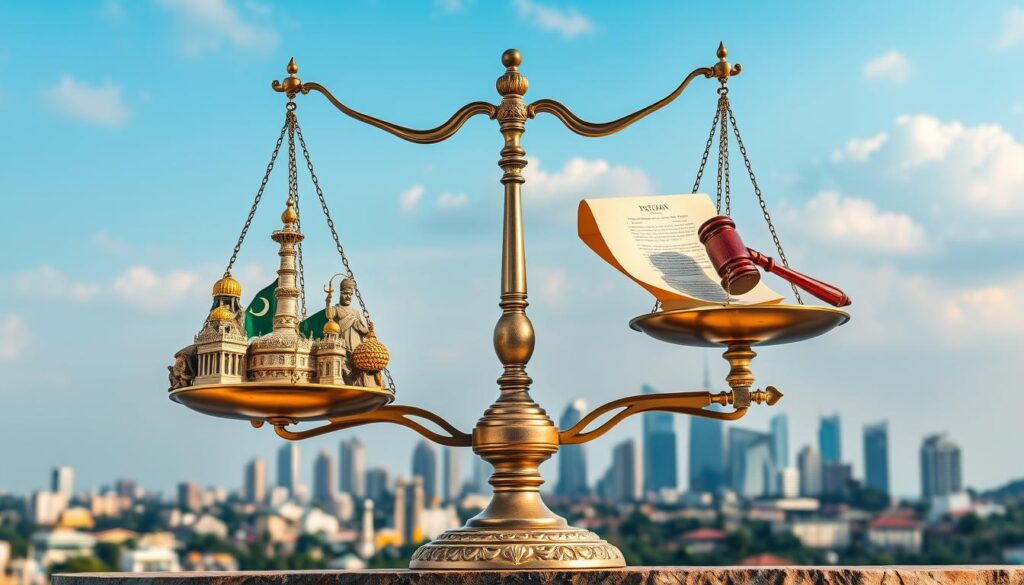
Politics and Religion
The mix of politics and religion in Pakistan is both interesting and debated. This mix is key to understanding power and faith’s role in the country’s government and values.
Understanding the Dynamics of Power and Faith
Politics and religion meet in a balance of influence. Religious views can guide political leaders, and political power can shape faith. This balance sparks a debate on where the sacred and secular meet.
The idea of power dynamics in politics and religion is complex. Religious leaders can sway public opinion and affect politics. At the same time, politicians use religious feelings to gain power and justify their plans. This mix affects people’s faith and freedoms.
“The relationship between politics and religion is a delicate dance, where the lines between the sacred and the secular are constantly being redrawn.”
Grasping this dynamic is key to understanding governance, policies, and values in Pakistan. As the country tries to balance politics and religion, it’s vital to have thoughtful talks and make ethical choices.
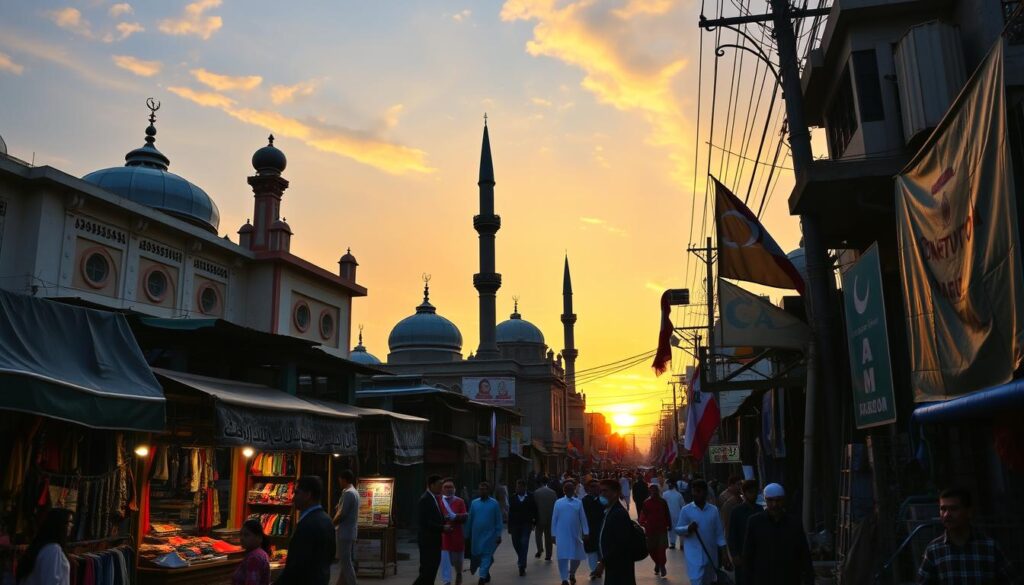
The mix of power dynamics and faith in Pakistan needs a close look. By exploring this complex relationship, we can better understand the country’s politics and society. This knowledge helps find fair and informed solutions.
Separation of Church and State
In Pakistan, the debate over church and state is complex. The constitution protects freedom of religion. Yet, religious ideas often shape government decisions. Finding a balance between secular and religious views is key.
Balancing Secular and Religious Interests
The government and religious groups in Pakistan have a tricky relationship. The state must follow secularism and make decisions based on facts. At the same time, the beliefs of most people are important for the country’s culture.
Finding harmony between these views is a long-term effort. It needs open talks, compromises, and respect for everyone’s rights. This means navigating the separation of church and state while honoring Pakistan’s heritage.
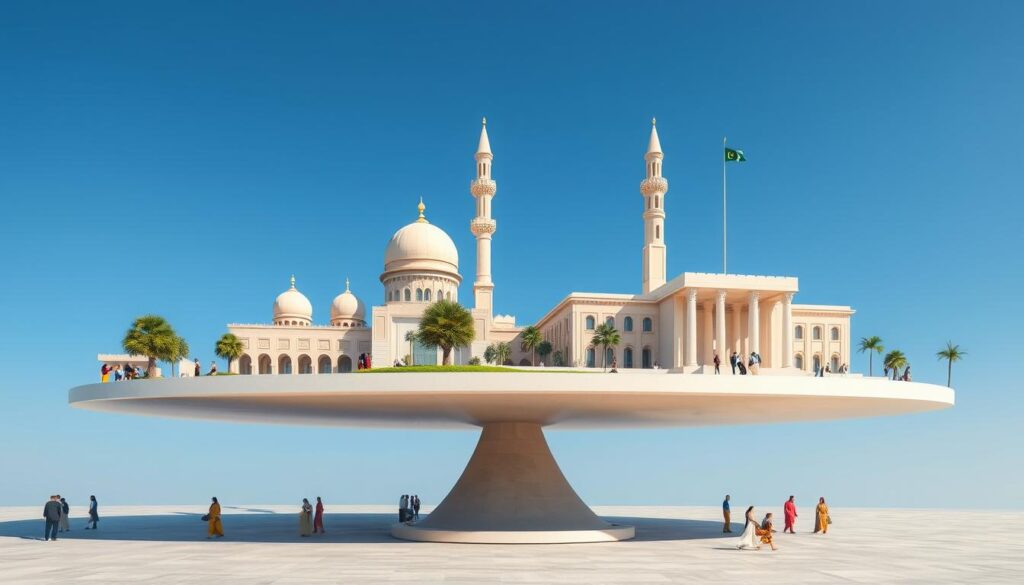
“The challenge is to find a way to balance the secular and religious interests in a manner that promotes unity, stability, and the wellbeing of all Pakistanis.”
The goal in Pakistan is not to ignore religion. It’s about making sure government decisions benefit everyone, no matter their faith. This is a continuous challenge that needs ongoing improvement to serve the nation’s changing needs.
Civil Liberties and Religious Practices
In Pakistan, the mix of civil liberties and religious practices is a big topic. The country is trying to find a balance between secularism and keeping religious freedom. This is a tough task with many challenges.
The right to freedom of religion is a big issue. The Pakistani Constitution says everyone has this right. But, some religious groups face problems and can’t practice freely.
The idea of civil liberties includes more than just religion. It also covers speech, assembly, and association. Sometimes, these rights clash with religious beliefs. Finding a way to respect everyone’s beliefs is key.
“The true test of a nation’s character is how it treats its religious minorities.”
Keeping civil liberties and religious practices in balance is an ongoing effort. Pakistan needs to keep talking, make laws, and be open to everyone. This way, the country can respect both individual rights and religious traditions.
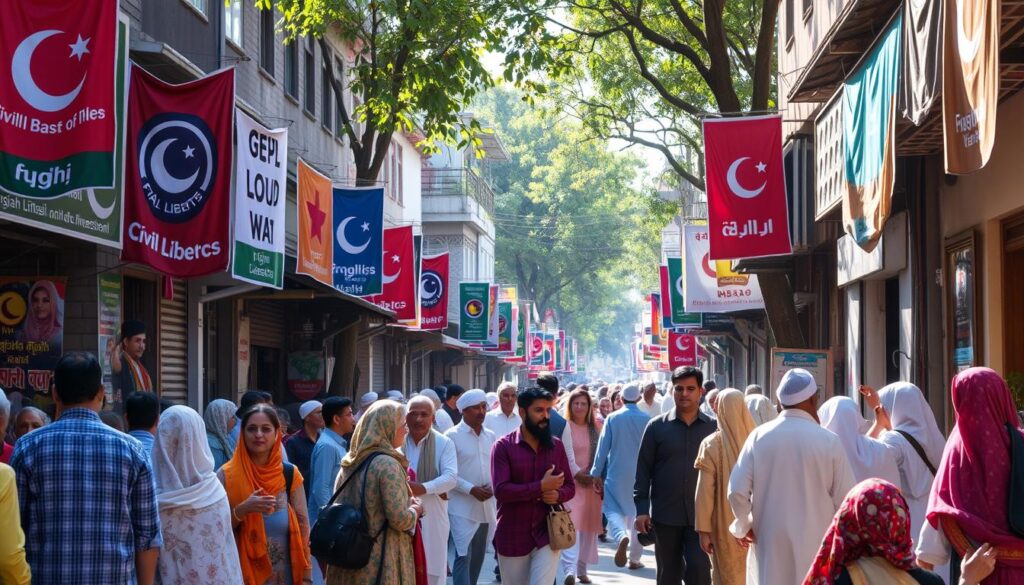
As Pakistan works on this balance, it’s important to remember that protecting civil liberties and religious practices go hand in hand. By valuing diversity and the worth of every person, Pakistan can aim for a fairer society for all.
Ethics and Secularism in Contemporary Pakistan
In today’s Pakistan, ethics, secularism, and cultural values are deeply connected. The country is trying to find its way through political and religious changes. It’s important to look at how these factors shape Pakistan’s identity and how it’s governed.
Navigating Cultural Norms and Societal Values
Pakistan’s culture is rich with traditions and beliefs. But, modernization and globalization bring new challenges. It’s a balance between keeping traditions alive and moving forward.
Secular ideals and ethics are key in this balance. They help protect individual rights and the well-being of all people.
Decisions made with the greater good in mind are crucial. Secularism promotes religious tolerance and equality. It helps create a society where everyone can succeed.
“The true measure of any society can be found in how it treats its most vulnerable members.” – Mahatma Gandhi
Leaders and policymakers in Pakistan face a big challenge. They need to understand the country’s history and respect its diversity. They must also protect the rights and freedoms of all citizens.
Pakistan can find a balance between tradition and progress. This path honors its culture while embracing ethics and secularism. The journey is tough, but it promises a brighter future for all Pakistanis.
Historical Perspectives on Faith and Governance
The relationship between faith and governance in Pakistan is complex and long. Religion has shaped the country’s politics and society over time. This section will look at how faith and governance have interacted, influencing policies and institutions.
Tracing the Evolution of Religion’s Influence
Since Pakistan began, religion has played a big role in its governance. Muhammad Ali Jinnah, the country’s founder, wanted Islamic principles to guide the government. But, this idea has been debated and interpreted many times.
In the early years, religion was more involved in politics. Religious leaders helped make laws and policies. The balance between secular and religious interests has changed, with more religious influence at times and efforts to keep church and state separate.
“The Constitution of Pakistan is based on the fundamental principles of Islam. It is our duty to preserve and protect this Islamic identity of Pakistan.”
– Zia-ul-Haq, Former President of Pakistan
The history of faith and governance in Pakistan shows how religion’s role has changed. Knowing these changes helps us understand the current mix of religious beliefs and secular interests in Pakistan.
Interfaith Dialogue and Pluralism
In Pakistan, the mix of religions calls for interfaith dialogue and pluralism more than ever. This part looks at how to bring different religious groups together. It’s about creating a society where everyone feels welcome and respected.
Accepting and valuing different religious views is key to a united society. Interfaith dialogue helps leaders and people come together. They tackle big issues, find common interests, and build a culture of kindness and respect.
The Interfaith Harmony Council is a great example. It brings people from different faiths to talk about important topics. They work to find common values, clear up misunderstandings, and solve problems together.
“Interfaith dialogue is not about finding a single, universal truth, but rather about acknowledging and celebrating the diversity of religious experiences and perspectives.”
Schools also play a big part by teaching about different religions. This helps students think critically, feel empathy, and value the diversity that makes Pakistan strong.
Pakistan faces many challenges with religion and politics. But, interfaith dialogue is crucial. By embracing diversity and understanding, the country can move towards a brighter, more united future.
Mediated Knowledge and Religious Beliefs
In modern Pakistan, the mix of mediated knowledge and religious beliefs is getting more complex. Digital platforms and easy access to information have changed how people see and understand their faith. This section will look at how this change has shaped the religious scene in Pakistan.
Social media and online forums have made sharing information fast, often skipping traditional religious leaders. This has led to more varied religious views, as people see different ideas and beliefs. While it encourages debate and thinking, it also risks spreading false information and new, sometimes disputed, religious stories.
Also, the rise of mediated knowledge has shaken the old ways of religious institutions. Now, people can learn about faith on their own, using many sources. This has made religious leaders and scholars work harder to stay relevant and meet the changing needs of their followers.
- Religious Beliefs and Political Ideologies
- Government Policies and Freedom of Religion
- Politics and Religion
- Separation of Church and State
- Civil Liberties and Religious Practices
- Ethics and Secularism in Contemporary Pakistan
- Historical Perspectives on Faith and Governance
- Interfaith Dialogue and Pluralism
- Mediated Knowledge and Religious Beliefs
